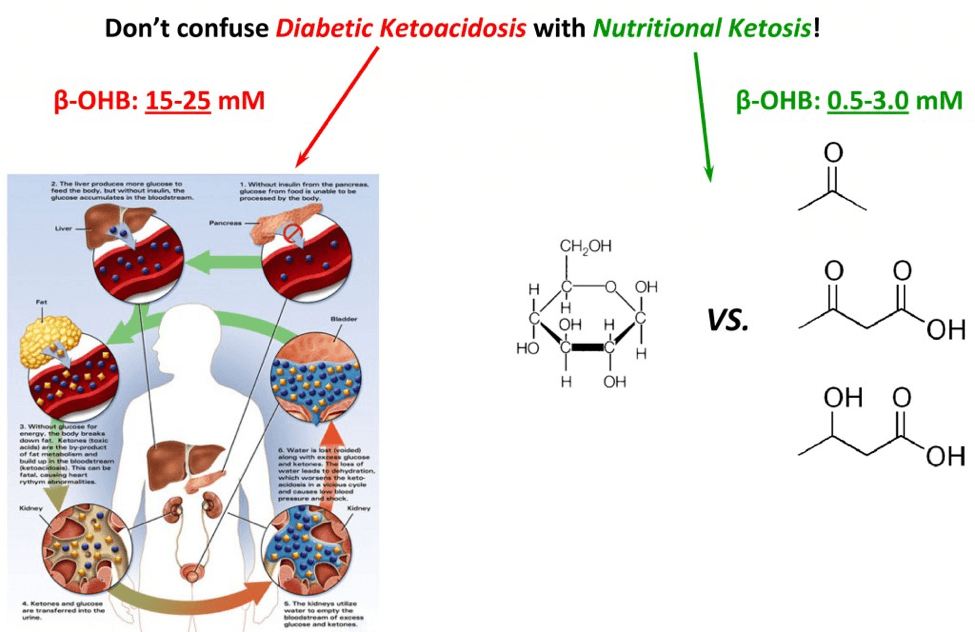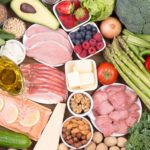You may have heard from your doctor that ketosis is a life-threatening condition. If so, your doctor is confusing diabetic ketoacidosis (DKA) with nutritional ketosis, or keto-adaptation.
First, some semantics. Our body can produce, from fat and some amino acids, three ketone bodies (a “ketone” refers to the chemical structure where oxygen is double-bonded to carbon sandwiched between at least 2 other carbons). These ketone bodies we produce are: acetone, acetoacetone, and beta-hydroxybutyrate (B-OHB). [For anyone who is interested, they are the 3 most right structures on the figure, below.]
Why do we make ketones? For starters, it’s a vital evolutionary advantage. Our brain can only function with glucose and ketones. Since we can’t store more than about 24 hours’ worth of glucose, we would all die of hypoglycemia if ever forced to fast for more than a day. Fortunately, our liver can take fat and select amino acids (the building blocks of proteins) and turn them into ketones, first and foremost to feed our brains. Hence, our body’s ability to produce ketones is required for basic survival.
What is diabetic ketoacidosis? When diabetics (usually Type I diabetics, but sometimes this occurs in very late-stage, insulin-dependent, Type II diabetics) fail to receive enough insulin, they go into an effective state of starvation. While they may have all the glucose in the world in their bloodstream, without insulin, they can’t get any into their cells. Hence, they are effectively going into starvation. The body does what it would do in anyone – it starts to make ketones out of fat and proteins. Here’s the problem: the diabetic patient in this case can’t produce any insulin, so there is no feedback loop and they continue to produce more and more ketones without stopping. By the time ketone levels (specifically, beta-hydroxybutyrate) approach 15 to 25 mM, the resulting pH imbalance leads to profound metabolic derangement and the patient is critically ill.
But this state of metabolic derangement is not actually possible in a person who can produce insulin, even in small amounts. The reason is that a feedback loop prevents the ketone level from getting high enough to cause the change in pH that leads to the cascade of bad problems. A person who is said to be “keto-adapted,” or in a state of nutritional ketosis, generally has beta-hydroxybutyrate levels between about 0.5 and 3.0 mM. This is far less than the levels required to cause harm through acid-base abnormalities.
Keto-adaption is a state, achieved through significant reduction of carbohydrate intake (typically to less than 50 grams per day) and moderate protein, where the body changes from relying on glycogen as its main source of energy to relying on fat. Specifically, the brain shifts from being primarily dependent on glucose, to being primarily dependent on beta-hydroxybutyrate. This has nothing to do with what a diabetic patient is experiencing in DKA, but does illustrate how poorly informed and quick to react the medical community is. DKA and nutritional ketosis (or keto-adaptation) have as much in common as a house fire and a fireplace.
Photo by Andrew Yardley on Unsplash








Hi, I was wondering how ketosis fits in with bodybuilding. I recently started bodybuilding and have been taking a lot of protein. Does ketosis correlate with catabolism? I need lots of protein. I am 254lbs 17 yrs old and have 34% body fat. What should my protein be like if o want to build muscle?
Not sure what you mean. Do you mean can you lose bodyfat and gain muscle in ketosis? If so, data from Jeff Volek says you can.
Could you name just a few so I can look further? 🙂 Thanks.
A few what (I don’t see previous comment in my dashboard)?
A few issues that could be involved in hypothyroid issues with symptoms making it hard for someone to keep going keto. They feel better when adding carbs.
Ahhh…check out Chris Kresser on this, along with Ron Rosedale.
Hi Dr. Attia! Love your site and what your are doing to get the word out there! Just two questions…I’ve been in ketosis for about a month and a half and have been noticing my short term memory is starting to become a little spotty at times…have you experienced this and do you think its transient? The second question is a fun one, i’ve been having a hard time trying to find the right ratio of fat and fiber to have consistent solid bowel movements…do you have an idea of how to help with this and what you do for yourself? Thanks so much, if you have any insights it would be greatly appreciated!
I have not heard this complaint. I wonder what is going on? As for regularity, it varies a lot by person. MCT oil, other fats, bouillon, and fiber in leafy veggies can all help.
I’m sure it has something to do with my brain adapting, not to mention that my mind races a little more now…constructively which i’m happy about so that might have something to do with it. I feel that a lot more of my little actions are going on autopilot to make room with the improved cognition.
Thanks for the advice, i take MCT oil everyday and i’ve got to just up my intake of fiber and fat. It’s so amazing to get rid of the insulin/glucose ball and chain that was connected to my leg that these little complications are worthwhile to work out. Keep up the good work!
Hi Pete,
Thanks for the post. I have a question for you.
I am a Type II diabetic, on a low carb (<40 grams a day) for the last 5 years and everytime the Dr peforms the urine test, he comes back saying it had ketones.
Most of the afternoons I do not eat anything after lunch until dinner and hence just before dinner, my blood sugar level will be ~75. Is presence of ketones in my blood stream not letting me pass out? else I hear that low blood sugar will trigger the brain to shut down (symptom: pass out).
Thanks in advance for your reply.
Thanks
Venkat
Would need to know more to provide insight, but if you’re eating <40 gm/day, I would expect ketones in your blood and possibly urine. The ketones in your blood are offsetting the low glucose in your blood. Are you still diabetic? Or did you mean a former type II?
Hi Peter,
Not sure how to respond to your response to my question since I did not see a reply right below your response.
To the question if I am a former type II or a current type II, I am a former type II if I stay low carb, current type II if I eat carbs.
I started low carbing after reading Dr Bernstein’s book, Dr. Michael R Eades, David Mendosa posts during May 2008.I do minimal to no exercises… have reserved that if the insulin resistance shows its ugly head, I would leverage exercise as a tool to handle insulin resistance at that stage.
I think you answered my question by stating that “The ketones in your blood are offsetting the low glucose in your blood”. I had a doubt if thats the case, I want to run it by a qualified person and hence I checked with you.
Thanks a lot for your quick reply. Please let me know if I need to provide information. And Thanks a lot for all the posts on ketosis. It is very very informative.
Thanks
Venkat
Great Read.I am back on ketosis The first time I was on this diet I got down to 7% bf ,Now Im aiming for 3% I Train for 2 hours a day weights and an hour cardio .I found today. My 1 to 4 rep range was fine and strong but then I just fail immediately not the slow decline in strength like normal.I’m hoping this muscle endurance issue is temporary but even if not I’m prepared to do this for the 12 week duration.Last time I was having a high carb meal once a week hut found it took to long to get back into ketosis.So this time I am not.I will keep you posted regularly.I am currently 12% bf at 92 kg I know they call me obese in the BMI scale sucks that bmi
Hey Doctor Pete
I’m looking to go Keto adaptive but I don’t eat any meats, only fish. Is it possible for me to go into ketosis?
Many thanks for your advice!
Kindest regards
Stuart
Possible, but pretty tough, especially if you eat dairy or eggs. If you are ok with dairy and eggs, but not meat, it’s pretty easy, as long as you don’t require 4,000 kcal/day like I do.
Yeah, I eat eggs and dairy!
Only just started eating full fat products as I used to do a lot of weight lifting and tended to keep my body fat around 7%! I’ve just got back into mountain biking and road riding after a few years off! I’ve always consumed considerable amounts of carbs, but since reading volek and Phinney’s book, low carb performance, it has completely made me re evaluate my diet?
Not sure I could go sub 50gms of carbs a day, but I’ll give it a go! Only so much cheese and full fat Greek yogurt a man can eat! I’ve cut out all foods containing added sugar, that’s made a big difference!
I have a feeling this could prove a difficult transition for me!
Thanks again Pete!
Stuart
No need to, Stuart. Just make a a few small changes at a time.
Question has some forethought to it but here goes: Lets say I have a weight loss goal and I hit it while on a ketogenic diet… How would I go about safely re-introducing carbs without gaining rebound weight? Would I just simply eat carbs in moderation like I should have done in the first place or does it require extreme limitations?
Empirically.
Dr. Attia I just found your site from MDA. I’ve been eating a low Carb high fat diet for a few months to lose weight. I occasionally find I want to add a bit of sweet potato or white potato. Are there any potential negative consequences from going in and out of ketosis? Thanks
Not sure, other than the possible need to re-adapt.
You may want to check out retrograding the starches in potatoes, not sure about sweet potato. I’m T2 diabetic and know for sure I can eat Anasazi beans and new potatoes if prepared properly, boil and let cool to room temperature then refrigerate at least 24 hours – cooling to room temp before refrigerating is key. Potatoes can be cut up and made into a low carb potato salad or can do like I do beans, I warm on lower power in microwave to just above room temp with butter. Have had my BG drop 1 hour PP compared to pre meal on a couple of occasions with the beans and have heard others mention same thing with the potatoes.
Dr. Attia,
You stated that being in dietary ketosis does not affect body pH. Does that mean that body pH “could” be low by the ketogenic diet and production of ketones doesn’t lower it more? I’ve read that meats, eggs, cheeses, saturated fats, lower alkalinity and I eat plenty of those.
I’m highly suspect of anything negatively said about saturated fats, especially when lumped in with other things said to cause certain conditions. I am in ketosis and have become interested in pH since trying to figure out if I am deficient in magnesium or potassium and read about sodium and/or potassium bicarbonate usage.
Assuming my pH is low, would you be able to recommend a way to determine the best means of raising alkalinity based on blood test results i.e. I’m going to the doctor to get blood work ordered next week and wonder if any specific test should be requested. In 10 years of lab work I see no blood pH in any results and was going to ask for that. Sodium and potassium numbers have always been in the normal ranges, sodium lower, potassium mid.
Slowly converting my GP to thinking that LCHF may not be so bad, but I think he is still stuck on the ADA and AHA recommendations since he referred to my way of eating as “Crisco diet” due to the use of coconut oil.
Thanks,
Mark
Addendum to prior post: I say low pH and raising alkalinity. Could be misnomer, because I know that there can be varying levels of alkalinity at a specific pH. You may want to set me straight on what I asked.
Thanks again,
Mark
The question is what does one mean by “body pH?” Arterial blood pH? Venous blood pH? cellular pH? There is so much misinformation around this…the body is shockingly good at keeping pH at 7.4 in the plasma. For the sake of space and time, I can’t even begin to get into acid-base balance, but it’s very well understood. Not sure why this issue is concern for so many folks, though. I guess it speaks to bad information? Ketosis = DKA?
Hi
I am a recently diagnosed type Two and am on 1500 mg of metformin per day. Taking metformin has had little effect on my blood glucose levels.
I happened to stumble across ketogenic diet information. The whole process of ketosis ( while still new and a little confusing) is making more sense to me than any other eating plan I have seen. I am hopeful that starting this eating regime will have the desired effect.
This forum has been very informative. Thank you for giving me some sensible arguments to consider.
Great site. I’m sure I will be visiting it regularly.
Hi Peter
Great blog… this has been an invaluable source that has allowed me to quickly experience the benefits of a ketoadaptive diet that you you have described. Couple questions below. If you know any good references off top of your head, those would be appreciated as well.
First question: Can you comment on any longitudinal or prospective data that is either currently available or anticipated on pediatric epileptic or other patient cohorts who have been in long term nutritional ketosis? I suspect there isn’t much currently (from browsing pubmed quickly). Perhaps this is a NUSI objective?
Second question: I’m not particularly concerned about this, but just wondering if you have had similar comments come up about acetone: a friend (a chemist of course) was concerned about the long term risks of “chronic” endogenous acetone exposure produced in nutritional ketosis. He cited the adverse effects of long term environmental acetone exposure. When I looked this up, I havent seen anything that convincingly suggests that even long term environmental exposures to acetone have any significant adverse health effects. “Haters” will be haters I suppose :-)! Their loss.
Thank you for your efforts and keep up the great work. I ‘ve learned a lot from you
1. I’m not very close to this literature, but I’m also not how sure how applicable it would be. Some of those diets are really different from most us in NK. VERY heavy n-6 PUFA oil dependent.
2. There is almost no production of acetone in NK. All the ketones are essential an equilibrium of B-OHB and acetoacetate.
Thanks Peter. What are your thoughts on the value of generating longitudinal data on individuals on NK by choice (those who have experienced the benefits of NK and have adapted the diet by choice)? The only reason I ask is that it seems this is an easy fall-back position of detractors: they can point out all the hypothetical risks involved of NK which might be observed over time which haven’t been evaluated, despite any immediate benefits that might be documented by individuals in NK, such as improvement in serum surrogate markers, subject report outcomes, etc.
Without such data, do you think it is difficult to defend the position that NK has benefits that extend beyond the surrogate markers? That being said I understand that designing such a long term outcome study could be daunting (ie sample size).
Normally I would think that science would speak for itself. but in this situation, overcoming the inertia of the nutritional industry is a daunting task. I’m looking forward to hearing more about the NUSI sponsored studies that I’m certain are going to challenge this conventional wisdom.
The problem with such data is that if they are not controlled, for example, if they rely on volunteers, they are subject to too many biases.
Hi Peter
I have been reading that one of the symptoms of ketosis is a dry mouth. What is the cause of this, and does it have any bearing on your level of hydration.
Hi Peter
I am curious to know if the dry mouth symptom related to ketosis has any bearing on hydration levels?
Hello I am new here and have tried to catch up on all the posts. Not there yet. I have been toying with Paleo for over 4 years. I have learned a great deal in the past few years but have managed only to decrease my consumption of grains and sugar but have never made a true commitment. Although I am not over weight, I am “skinny fat”-little belly and more recently back fat. I have never enjoyed exercising but understand that it is beneficial I just don’t -yet. I can be very restrictive with my carbs and probably have gone into ketosis -most recently this past week. I felt fine and saw a decrease in appetite and tummy issues resolved. However my mood plummeted and I still feel very tired both upon awakening and throughout the day. My age is 43 and I had premature menopause at 38. I take BHRT prescribed by an MD (only progesterone and testosterone no estrogens). Should a person prone to depression and moodiness ingest a minimum amount of carbs or do I need to make a clean commitment for several months? Could inadvertently cycling in and out of ketosis be causing my low mood? Should I carb count to ensure steady intake and should I be taking supplements in addition to Vit D and omega 3? I have Raynaud’s syndrome and today my joints were aching. My primary goal is to increase my energy and feel rested, especially when I wake up in the morning. I should mention that my family has suffered great distress due the illness of our child. I want to model some good behavior especially as our eldest child is gaining weight. I welcome input from readers and Dr Attia…
Paula, yesterday I was reading an old post of Dr Eades’ and he states that low carb diet requires more sodium and water than you are probably used to ingesting. Check out his blog. He wrote a series of books including Protein Power with his wife.
Hi Dr. Attia
Thank you for sharing your information . I need to know more about MCT and Ketosis .
How much ketone bodies can be produced in their process of energy production .
As I am reading about the use of MCT in the treatment of Alzheimer’s in their ketogenic diet .
I know the difference between LCFA and MCFA in their metabolism . Would you please tell me the difference in their ketone body production . in other words is it right to say , to reach ketosis level we can depend on MCT better ?THANK YOU
You certainly do not need MCT to be in ketosis, and MCT alone, does not ensure ketosis.
Hello Dr. Attia,
I read that urine test strips have little to no value in determining whether I am in ketosis or not. Therefore, I was planning on buying a product to test my blood instead. The only one I can easily find is the Precision Xtra device which measures both glucose and ketone bodies. Do you think this is a good investment? I really want to make sure I can trust the test results. Which product do you use for your own tests?
Thank you,
Kevin
I use that brand.
Thanks for the reply, and thanks for the website in general. The information listed here was invaluable for setting up my keto diet. In fact, just a week ago I didn’t even know what ketosis was and now I already feel like a pro! Also, the fact that you are a physically active person reassured me that it is possible to cut carbs and still be involved in sports. I am pretty active myself and I must admit that such a huge reduction in carbs scared me a bit at first.
In any case, I hope I’ll be able to raise awareness about low-carb goodness here in Montreal. People seem to find the concept so unnatural and wrong.
Cheers!
Hi Dr Peter….
Im a couple weeks into Ketogenic diet….and I generally work out 2 times per day….can I still consume the customary 1 gram protein/ 1 lb of body weight and still be in Ketosis….
My main source of fat is coconut oil and eat I one solid meal of meat and veges at night. I consume about 10 tablespoons a day of coco oil in my protein shakes…..evenly spaced throughout the day…
ultimate goal is to maintain and build muscle but to get less than 50 g of carbs per day…
no one speaks about these issues….I need your guidance…
tj
Hi,
Recently, I’ve been diagnosed with hypoglycemia and using diaformin for a week now. My doctor also put me in a diet that’s high on protein, no carbs (except brown bread) and lots of healty snacks. My blood sugar levels never been better.
My question is, my fingers started to taste sweet. No sweetness on arms though.. I can feel it on my lips too. I asked my doctor, he had no clue. Than with some research online, I came across people who also have sweet fingers according to ‘ketons.’
I’m still searching for a solution, wondering if this is an adapdation process or a dangerous symptom of something else.
Thank you!
Ceren
You could ask your doctor to check your ketone levels, I guess?
Hi there,
First thank you for providing such thorough and detailed info on your site. I am furious that conventional diet/medical advice is so wrong. I have been working towards keto adapting since april and have finally sorted out the amount of protein i can eat to stay in optimal (past 2 weeks).
Early weight loss, then a lb every other week, now two lb last week. I like the slow loss as i am also doing some resistance training 2-3 times a week now to tone up as i lose.
1. My question is what should fasting glucose be? I have been 4.2 at the lowest (with ketones at 3.1 – the highest fasting that same day).
2. i would also like to know when i should go in for blood tests and what i tell my doctor if my cholesterol is higher than he would like to see. I remember you saying that there is a different analysis of the numbers he could do.
Thank you for your great work!
Aside from the gradual weight loss, i can finally breathe out of both of my nostrils ( i thought i had a blockage or something for the past 15 years), i avoided two flu/colds that came through our household since april (unheard of for me) , i have the mental clarity that i only get while taking bifentin ( for adhd), but WITHOUT THE HYPERNESS; and my chronic tendonitis in both my elbows and knee have virtually disappeared and has enabled me to successufully do my weight training. I have to say that i have accomplished more in the past 6 weeks than i have in over 4 years: focused, no automatic multi-tasking (i can remain focused and prioritize easily), and my creativity has returned; AND NO MORE DEPRESSION, i have suffered from depression my whole life. (I still have the same stress, now i can handle it much better).
I have managed to stave off carb cravings easily by thinking about how horrible and depressed i felt all my life while on carbs and sugar addiction (with blood ketone testîng i have figured i cannot eat many at all, must be my polish genes!)
This diet has saved me from a life of stress and misery, literally!
Thanks,
Kate, a fellow canadian
Kate, a normal fasting glucose is probably below 5.2 mM, but it’s dependent on many things. The series on cholesterol will help with your second question, including the yet-to-be-written part X.